3-spot pass-cut-fill
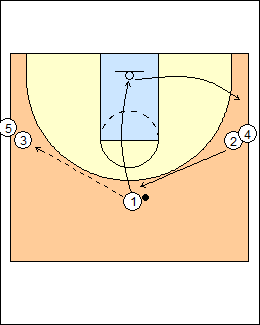 | 1 Jr. NBA See YouTube video - 3-person pass-cut-replace, also Jr. NBA - Offence, and Progressions below (3 on 0, 5 on 0). One ball, one player out top. 1 passes to 3 (or 2) and cuts up the middle to the rim looking for the ball, then goes out opposite. 2 flashes to the top. Facundo Petracci - NCCP Super Clinic 2018 - after passing the cutter can a) cut straight (for a bounce pass), b) take his defender weakside, stop and swim (face cut), or c) cut towards the ball, swim and go backdoor - the cutter takes his defender all the way to the baseline, opens up, seeing the ball, clears weakside. (Progressions) - fill the top through a read spot (v-cut) - replace the cutter after a two-count (late fill) - add a coach who guards the ball out top, the passer reads whether coach jumps to the ball on a pass. In a game, the basket cut by 1 is a scoring opportunity, and opens up a double gap for dribble penetration by 3 (behind the cutter) or a blast cut to the ball by 2. Create double gaps by spacing and cutting (basket cut, backcut, blast cut), use double gaps for drives and blast cuts. Basket cut on a downhill pass to create a double gap (the ball can come back where it came from), especially on a stationary pass (e.g. to a corner). Make a delayed drive behind the cutter (a draft drive), or a blast cut to the ball for a zero-second dynamic attack. Use a backcut to avoid a stationary pass where possible, with a draft drive or blast cut (a backcut is also a scorning opportunity). On a dynamic downhill pass, optionally pass and hold, allowing an immediate drive, then backcut if there is no play. Pass and hold on an uphill pass, we want the ball to keep going (ball reversal), backcut or screen away if there is no play. Optionally pass up and screen away. Dribble-drive motion - pass through a single gap to open the gap, usually change sides of the floor with a corner cut (cut away on a pass down, cut under on a pass across, hold on a pass up). Attack double and triple gaps. Backcuts and blast cuts are secondary options in DDM. Optionally a) in a single gap, backcut if overplayed or on a pass fake or dribble-at, or if denied on a dribble-at; b) in a double gap, blast cut if there is no drive. |
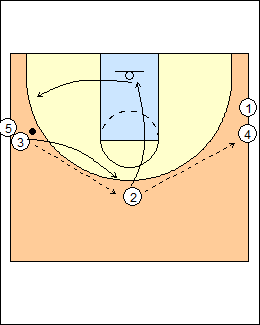 | 2 3 passes to 2 who swings the ball to 4 and cuts up the middle, 3 replaces 2 at the top, continue (3 will swing the ball to 5 and cut). Finish the drill with a give-and-go layup. Catch in triple-threat position. In a game, quick ball reversal can get defenders closing out, attack the closeouts. |
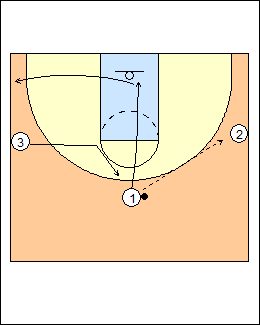 | Also work on breakdown layups, see below and Layups - Open-post motion - basket cuts - draft drives - blast cuts (dynamic attack, draft drive, backcut) - single-gap backcuts. 1) 3 on 0 Layup drill progression - corner-wing blast cut (dynamic drive, backcut), basket cut, draft drive behind. |
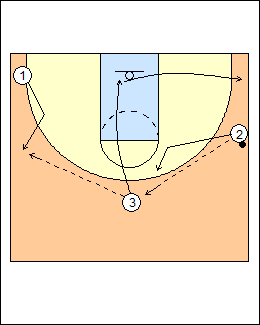 | 4 1 exit cuts to the corner, 3 blast cuts (fills through a read spot), the pass arrives at the same time. The blast cut creates another double gap. Mike McNeill - 3 and a pass should arrive at the same time. Layup options - wing-top blast cut (dynamic drive, backcut). |
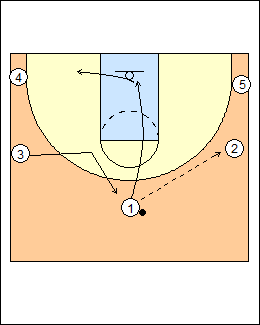 | 5 3 does not make a play, 1 blast cuts to the wing on eye contact, 3 basket cuts, continue (2 blast cuts). See Scrimmage - Bigelow 3 on 3 with passers, Tactics - 3 on 0 basket cuts, Spurs 3 on 0, Teaching 4-out motion.  |
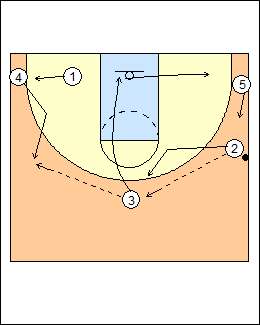 | 2) 5 on 0 a) Basket cuts Five players, the passing pattern is the same (no corner passes), basket cut only on a pass to a wing, fill late. 1 passes to 2 (a stationary pass) and basket cuts. The basket cut unlocks the floor, 2 has a double gap to drive middle (a draft drive), or 3 can blast cut to replace 1. A draft drive is delayed, waiting on a cutter; a blast cut can lead to a zero-second dynamic attack. Alex Sarama - Teaching Offensive Concepts - a double/triple gap, match-up advantage, or late clock is a green-light situation in a static 1-on-1. Randy Sherman - on a diagonal pass (slot to wing), make a diagonal cut directly to the opposite corner. SNYB - Offensive/Defensive Concepts - 1 can cut to the basket or exchange away with opposite wing 3. Sarama - it would be better for players to pass and space than pass and cut. Layup options - basket cut (stationary pass), draft drive. |
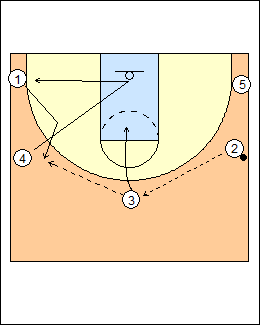 | 7 3 blast cuts for a pass (a delayed cut). 1 exits to the short corner, 4 can hold the corner. The blast cut can lead to an immediate attack, e.g. a "real-estate" drive into a double gap created by the blast cut. A blast cut can lead to another blast cut. 2 does not need to basket cut, the blast cut creates a dynamic 1-on-1, and the next pass should be to 4 not 5. Screening for 5 is an option. If 3 does not make a play, 2 can backcut or downscreen for 5. Optionally 2 can screen away or basket cut on a stationary uphill pass. Matt Hackenberg - 5-out screen away motion - if denied, backcut or downscreen and fill from behind. Chris Oliver - Build and Coach Conceptual Offence - a dunker spot is a spacing spot, the Boston Celtics put guards there. |
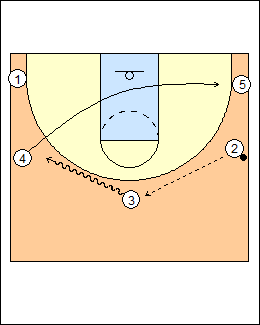 | 8 3 does not make a play, 4 blast cuts on eye contact, 1 fills behind, 3 passes and basket cuts. MacKay single-double gaps - the blast cut creates a dynamic attack, 3 passes and holds. (3 can backcut and 2 blast cut if 4 does not make a play.) If 3 basket cuts, 4 has to wait for the cutter to clear (a draft drive), or 3 is in the way if 4 attacks off the catch, forcing 3 to break off the basket cut. How else can we create the next double gap in case 4 does not make a play? Instead of a basket cut, have 3 - clear to the weakside corner or short corner - exchange with 2 - hold or space away, then backcut if 4 does not attack and looks at 3 (so 2 can blast cut). See Blog post - Blast Cuts. |
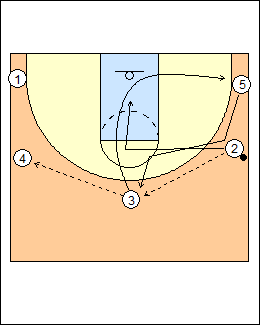 | 9 2 blast cuts for a pass, 3 exits, 5 holds the corner, will then blast cut to the wing. This is simple 5-out motion. |
 | 10 Progressions 1) Basket cut on wing-corner passes 1 passes and basket cuts. Passes to the corners are also stationary passes. |
 | 11 2 passes to the corner and basket cuts. 3 fills the top (a double gap from the ball), 4 and 1 fill behind. In a game, 5 could "draft" drive behind 2's cut. NSW open-post motion - cutting on the back of a cutter is effective (here 2 cuts behind 1). Layup drill options - basket cut, draft drive. |
 | 12 2 exits, 3 blast cuts to the wing for a pass (and could attack immediately). Layups - top-wing blast cut (drive, backcut). |
 | 13 4 blast cuts. |
 | 14 1 blast cuts, 4 passes and basket cuts. |
 | 15 |
 | 16 2) Backcuts a) Backcut on a pass fake Continuing from above, 3 blast cuts to the wing , 2 pass fakes, 3 backcuts, 5 replaces 3 (with no delay), 4 fills behind to a double gap. In a game, backcut if overplayed, and optionally on a pass fake. See Offence - Petitgoue open-post (Revolve). |
 | 17 b) Backcut entries Use a backcut to avoid a stationary pass. i) 2 backcuts, 5 blast cuts for a pass, 1 basket cuts, into the offence. Decide whether 5 blast cuts immediately (as an entry play), or 1 can draft drive first. If 2 clears weakside, 1 would fill the ballside corner. Layup options - backcut, draft drive behind - blast cut, basket cut, draft drive. MacKay - How to Teach Cutting - in a single gap, backcut immediately if you are looked at, dribbled at, or pivoted at. Alex Sarama - Teaching Offensive Concepts - if you are in a single gap, create a double gap for a teammate so they can blast cut. Oliver - a three side is bad spacing if you don't solve it, e.g. the middle player 45 cuts and empties. See Offence - 5-out dribble-attack continuity. |
 | 18 |